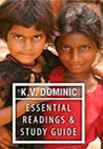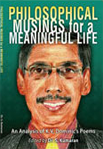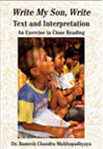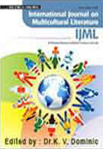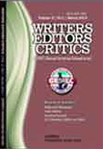Interviews
Prof. K. V. Dominic in Conversation with Parthajit Ghosh*
(Published in 30.2 July issue of Poetcrit, Maranda, H.P., India)
K. V. Dominic (born 13 February 1956), one of the most contemporary Indian English poets of considerable merit, short story writer, editor, critic and a retired professor from Kerala, is very keen to his observation and is very impressionistic, real and utmost truthful to his writings through which he exhibits his utmost disappointment to his society where man glorifies the triumph over space and many a scientific invention, but still, man has to suffer being the victim of terrorism, injustice, inequality, inhumanity, casteism, religious hooliganism, hypocrisy and much more man-made malices. Dominic is a true multiculturalist, an ideologist, a monotheist (a believer in Advaitavada) who reminds his fellow being by mirroring the reality. He is a ‘leftist poet’ who is “compassionate to the poor, downtrodden, the marginalized and women”.
His acclamation as a poet reveals after his constant publications like Winged Reason (2010), Write Son, Write (2011), Multicultural Symphony (2014), Contemporary Concerns and Beyond (2016) etc. He has also authored and edited more than twenty books of criticism on different literary genres and a collection of short stories. A Complete collection of his poems entitled K V Dominic Essential Readings and Study Guide is aimed at inclusion in the syllabus of South Asian Studies in USA, UK, Canada and Australia. Dominic is the Secretary of the Guild of Indian English Writers, Editors and Critics (GIEWEC), who as an editor-in-chief edits two biannual peer reviewed international journals, International Journal on Multicultural Literature (IJML) and Writers Editors Critics (WEC). He is conferred with several national and international awards for his writing excellence and his poems are translated into several national and foreign languages.
The text of the interview:
Parthajit Ghosh: Good Evening, Prof. Dominic! Thank you very much for your kind consent for this conversation!
Dominic: Good Evening dear Parthajit. I am only happy to converse with you.
PG: You have authored and edited more than twenty books of criticism on different literary genres, a collection of short stories and four individual anthologies of poems. Hence, you are a critic, writer and poet as well. In the last issue of Poetcrit (Jan-June 2017), Dr. Sulakshna Sharma in her review of your book, K. V. Dominic: Essential Readings and Study Guide: Poems about Social Justice, Women’s Rights, and the Environment, has commented that “K. V. Dominic is a far better poet than a short story writer” (2017, 180). So, kindly tell us, in which do you feel about your best puissance – criticism, writing stories or composing poetry?
Dominic: What Dr. Sulakshna Sharma has observed is true. I too feel that I can wield poetry better than other genres of literature.
PG: Recently, in an interview with Dr. P. V. Laxmi Prasad, Prof. Manoj Das, an eminent Sahitya Akademi Award winning writer, said that “Poetry can best be written in one’s mother-tongue” (Poetcrit 30.1, 2017: 11).Malayalam is your native language and you write in English. So, will you kindly share the cognitive process of your composition? Or, is it a natural process to an English Professor?
Dominic: Let me admit frankly that I am very poor in using my mother tongue Malayalam in literature. I have such diffidence that my compositions would be a flop in Malayalam.
PG: In your fourth volume of poetry, Contemporary Concerns and Beyond (2016), you have prefaced that “I have adopted a poetic style of my own and never try to imitate any predecessor or contemporary poet”. So, your poetry must be experimental in nature. Kindly elucidate your poetic style.
Dominic: I believe that every poet has an individual style even if it is influenced by poetic style of others. In my case I haven’t deliberately imitated any one’s style. For me content of a poem is more important than its style. If there is a strong message in the poem I don’t care for its frills or vehicle. The only thing I care about regarding the style is that the lines should be rhythmic than pure prosaic. I use only free verse and never bother about rhymes. Majority of my poems is more narrative than lyrical. The difference between prose and poetry is very thin in my poems. Still my poems are appreciated because of the message and values they carry.
PG: In your poems the phrases like ‘religious fundamentalism’, ‘multiculturalism’, ‘sexism’, ‘regionalism’, ‘parochialism’, ‘nationalism’, ‘patriotism’, ‘communalism’ and many more ‘-isms’ are frequently used. These types of philosophical terms are very common to be found in critic’s disquisition on literary texts. Do you consciously use them as an experiment in your poetry? Or is it the influence of a practicing critic for long time on a poet?
Dominic: I am deliberately using these terms because they carry the burning issues of the contemporary world which I want to present before the readers. After all these terms are commonly used now and are familiar with the ordinary people.
PG: On reading your poems, especially ‘Multicultural Harmony’, ‘Write, My Son, Write’, ‘Karma is Akarma’, ‘Tyagi’, ‘Vasudhaiva Kutumbakam’ and many others it may be said that Dominic philosophizes reality. How far do you agree with this?
Dominic: True, I have been philosophizing reality. I had a double purpose in mind in composing poems on these philosophical ideas. I wanted to elucidate these abstract terms as well as portray their application in reality.
PG: In ‘Multicultural Harmony’, you write: ‘from atoms to the heavens / multiculturalism reigns’, seems to be the offshoot of such pantheistic view as alluded in Sri Isopanishad: “Isa vasyamidam sarvam yat kinca jagatyam jagat” (Everything animate or inanimate that is within the universe is controlled and owned by God). How far are you successful to moralise the reality representing The Upanishad?
Dominic: I am a pantheist and believe that everything comes from God, the Creator and hence divinity is there in all living beings and non-living objects. I have been greatly influenced by Hinduism and Buddhism, the two greatest philosophies that originated from the land which gave birth to me.
PG: Another masterpiece, ‘Write, My Son, Write’, a long poem in 21 parts, begins with:
My son,
I have a mission
in your creation,
God spoke
To my ears.
It is as if you have listened to the oracle of God being “the right or correct son of the father figure”. And, Dr. Ramesh Chandra Mukhopadhyaya, the veteran poet and critic, in his disquisition, K. V. Dominic’s Write, My Son, Write – Text and Interpretation: An Exercise in Close Reading has established the Pagan relation to it and proved you as a ‘demigod’. How far do you believe that you are a demigod and your pen is your weapon gifted by God?
Dominic: Dr. Ramesh Chandra Mukhopadhyaya’s reference to me as a ‘demigod’ is only a hyperbole. True, the poem is in the form of an oracle of God. I am just an ordinary man and used this dramatic monologue style as to impart the messages to the readers in a convincing manner.
PG: you conclude ‘Multicultural Harmony’ urging for a single nation, ‘THE WORLD’ where:
Let there be no India, Pakistan or China
America, Africa, Europe or Australia
But only one nation THE WORLD
where every being lives in perfect harmony
as one entity in multicultural world.
Rabindranath Tagore in his Gitanjali (song 35) discovers the ‘heaven of freedom’ “Where the world has not been broken up into fragments / By narrow domestic walls”. How do you feel the influence of Tagore in this composition?
Dominic: All serious writers and thinkers dream of the unification of this world, a world without any walls or borders. They are all against divisions among people under any label. Hence I too thought in that line and composed many poems. I like Tagore’s works but my compositions are not influenced by them.
PG: Prof. T. V. Reddy in his enormous work, A Critical survey of Indo-English Poetry has shown, “like most of the Keralites Dominic too comes under the influence of the Communist ideology”. You bid ‘Lal Salaam’ to show your gratitude at the death of the thrice chief minister of your state, E.K. Nayanar; and, you have written a poem like ‘Lal Salaam to Labour’. So, are you communist a poet?
Dominic: True I am a leftist poet who believes in the existence of the Creator. I am compassionate to the poor, downtrodden, the marginalized and women. Majority of my poems are about them and their burning issues and problems. I am all against exploitations in the name of religion and politics.
PG: Your poems like ‘A Sheep’s Wail’, ‘Cuckoo Singing’, ‘I am Just a Mango Tree’, ‘Nature’s Bounties’, ‘Nature Weeps’, ‘Ammini’s Lament’, ‘Ammini’s Demise’, ‘Massacre of Cats’, ‘ A Cow on the Lane’ and many other prove that you are a worshipper of peace and integrity. But, contradictory enough, you outrage, your disgust in ‘A Blissful Voyage’ from Winged Reason wishing:
I wish I were a bullet
and shoot into the chest of that terrorist
who compels that teenage boy
to explode and kill that innocent mob.
Are you such a revolutionary thinker who wishes to establish justice by bullet?
Dominic: Though I have written those lines in the tone of a revolutionary I am basically a worshipper of peace and integrity. Through those lines I have expressed my uncontrollable dislike to the activities of the terrorist. I haven’t exploded such in any other poems.
PG: Creator, creation and creature –‘simple enough to learn the relation’ – are the truth behind whole existence where mankind is never imagined to be divided into categories. How does this view motivate you to portray the envirealistic pen picture through your eco-poems? How far have you succeeded in seeking environmental justice to all creatures?
Dominic: This nature and environment have been exploited and destroyed by humans to such an extent that a total destruction is not far away. Hence it is the duty of writers and thinkers to make the people aware and alert of it. If we understand the relation between the Creator, creation and creature as well as the purpose behind the creation we will stop exploitation of the nature. Indiscriminate felling of trees and killing of animals have to be stopped for their survival as well as ours.
PG: You are considered as the voice of the subaltern, the suppressed or the Dalits. Have you ever felt suppressed in your own society that makes you to write?
Dominic: I have never been suppressed in my own society. But I can feel the suppression of others around me. I have written about the problems of the subaltern in the Indian scenario. And most of them are based on historical incidents
PG: A celebrated contemporary Bengali poet, my own favourite, Joy Goswami, impressively commented, “Within my lifespan, in my individual life and in the entire Earth, even at the outside of the Earth; whatever keeps going on are all the part of my Autobiography” (translated). Do you agree with that? How far is it appropriate to your poetry?
Dominic: In my case I have written much on what I have observed in the outside world than from autobiographical. Fortunately my life has been very smooth with very little problems.
PG: Your poems are studied and compared with some of your contemporaries, thematically and also critically. Kindly share your views on your contemporaries who influence your art of versification.
Dominic: As I stated earlier I have never tried to imitate any writer dead or living. I like many of my contemporaries but their poetic style has never influenced me. Like me they are also writing on the burning issues and problems of this world and naturally there will be comparisons among us thematically.
PG: Now-a-days, many an emerging poet is blooming out. Kindly tell me about such emerging poets whom you like most. What will be your suggestion to them?
Dominic: True, there are many emerging young talents. I don’t want to mention any name. Some have concentrated more on the theme of love—quite naturally taking their age into consideration. There are a few young poets who are thinking very seriously like us, elder generation, and writing on more serious themes. My suggestion to all emerging poets is that they are the ones who have to live more in this fast degenerating world and hence it is their duty to convert the butcher culture minds of the younger generation.
PG: Kindly share about your new projects including all the other genres like stories, criticism and others.
Dominic: I have no such new projects in my mind. I will go on writing poems and short stories and get them published when they are sufficient for volumes. Similarly I will assist others to edit books and bring out as many critical books as possible.
PG: Thank you Prof. Dominic, for your precious time that you spared and spent with me! Thank you a lot!
Dominic: It was really pleasurable conversing with you dear Parthajit. God bless you!
[*Parthajit Ghosh, Research Scholar, Pt. Ravishankar Shukla University, Raipur -492010 Email: parthajitg@gmail.com]

